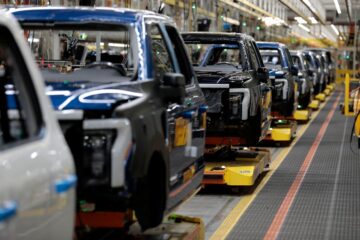U.S. automobile buyers may have set a record with over 1 million electric vehicle purchases in 2023, but that number still only represented 7.6% of the auto industry’s sales.
The challenges that the EV industry faced in 2023 were revealed in an American Automobile Association survey in July 2022. The survey identified 10 different issues that discouraged auto buyers from considering an EV.
Related: Elon Musk walks back on a tough Tesla decision he made weeks ago
The consumer concerns included high sale price, fear of fire, availability of EV repair options, lack of choice, pickup trucks and towing and high cost of battery repair and replacement. Several concerns dealt with the charging of batteries, including lack of charging locations, no home charging option, range anxiety, and cold-weather range.
All of those charging issues are still valid today, and EV makers and charging infrastructure companies are busy trying to improve charging technology to relieve potential EV buyer concerns.
EV supercharging became a huge issue at industry leader Tesla (TSLA) on April 29 as company CEO Elon Musk laid off the company’s senior director of electric vehicle charging, Rebecca Tinucci and roughly 500 of her Supercharger team. Tinucci’s team was responsible for Tesla’s Supercharger initiative, which develops fast-charging stations that can charge Tesla vehicles in 15 minutes, adding 200 miles of range.
Related: Despite charging and range anxiety, EV owners won’t give up their cars
Musk realized after about two weeks that he made a big mistake and reportedly tried to hire back many of the 500 people that Tesla terminated. The Tesla CEO might not be able to convince everyone he wants to return as competitors have reached out to the former Tesla employees, including BP, which was recruiting laid off Tesla Supercharger employees for its electric vehicle charging division.
While Musk and Tesla try to recharge their Supercharger team, one charging solutions company might have some experienced employees ready to sign up with Tesla, BP or any other charger player.
FreeWire electric vehicle charger as Vice President Kamala Harris, second left, tours the Los Angeles Cleantech Incubator (LACI) in Los Angeles April 17, 2023. Photographer: Eric Thayer/Bloomberg via Getty Images
FreeWire files WARN with plans to close headquarters
Electric vehicle charging solutions company FreeWire Technologies is set to shut down its headquarters and lay off all 113 of its employees by June 24, based on a federal Worker Adjustment and Retraining Notification filing on April 25.
Under the U.S. Department of Labor WARN guidelines, companies with 100 or more full-time employees and is laying off 50 employees at a single site of employment must provide at least 60 calendar days of advance notice of a plant closing or mass layoff.
More EVs:
Bankrupt essential retailer liquidates several more storesLuxury apparel chain shuts U.S. stores in Chapter 15 bankruptcyRestaurant chain closes dozens of locations as bankruptcy looms
FreeWire is seeking “additional capital,” however, as it hopes to continue growing, a company spokesperson said in a statement to C-Store Dive.
The Newark, Calif., EV technology company provides EV charging infrastructure to convenience stores and other business sites. Under its Accelerate Program, businesses have the option to host ultrafast EV chargers with zero upfront fees, share in charger revenue and to own the charging assets after the fifth year following installation, according to the company’s website.
Chevron (CVX) was one of the first companies to participate in the Accelerate Program, C-Store Dive reported. Phillips 66 (PSX) and Loop Neighborhood convenience stores also use FreeWire EV charging services.
FreeWire has already ceased operations in Europe, according to a LinkedIn post on May 3 by James Jean-Louis, the company’s European head of sales. Jean-Louis said the company in February, decided to withdraw from all non-North American markets.
Jean-Louis, whose final day with the company was May 3, said the inability to give adequate field service support and maintenance were the main contributing factor in closing down European operations.
Related: Veteran fund manager picks favorite stocks for 2024


